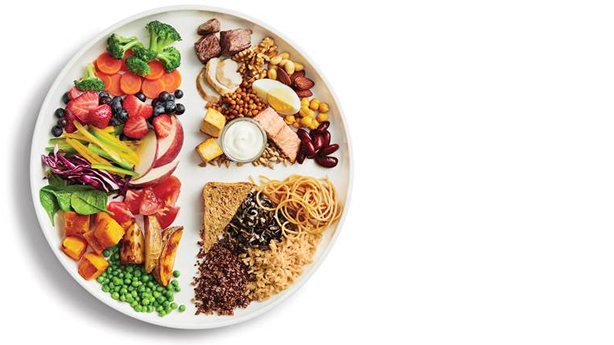

One of the keys to a healthy life is proper nutrition. Balanced and regular nutrition is considered as a factor that prevents many diseases. In hospitals and other health institutions, the unit that serves patients and clients with a healthy and balanced diet in order to increase the quality of life of people and to achieve a healthier body by applying a nutrition plan suitable for their body's metabolism activities is called the nutrition and diet unit. It provides services to clients for many diseases and conditions such as weight loss, proper nutrition for diabetes patients, and proper nutrition during pregnancy.

1. Healthy Weight Loss
Weight problem is among the health problems that many people complain about. The weight problem invites many diseases. The problem of overweight, which is seen at almost every age, can be solved in line with the diet plan to be applied by a nutrition and dietetic specialist, and the standard of living of the people can be increased in this way.
2. Healthy Weight Gain
In cases of being overweight as well as being underweight, the help of a nutrition and dietetic specialist should be sought. Not being able to gain weight is a risky situation in terms of health and can cause weakening of the muscles of the person, weakening of the bones and damage to the organs. Therefore, it is important for people who have the problem of not gaining weight to apply to the nutrition and diet unit of health institutions in order to ensure the balance of muscle-bone density and to ensure that their blood values return to normal.
3. Pregnancy and Lactation Nutritional Problems
Pregnant women should pay attention to their nutrition for the healthy development of their babies. The nutritional plan that should be applied at each stage of pregnancy differs, and depending on factors such as age, height-weight ratio, which foods should be consumed by pregnant women and in what proportion. In this case, the nutrition and diet unit is important for women to have a healthy pregnancy process. Pregnant women should follow the rules of regular and balanced nutrition during the breastfeeding period after giving birth to their babies. Since breast milk contains sufficient nutritional values for the development of the baby, it is a matter to be considered that the mother should apply to the nutrition and diet unit during the breastfeeding period.
4. Childhood Nutritional Problems
Health problems such as type 2 diabetes, obesity, hypercholesterolemia can be experienced in childhood. The nutrition and diet unit takes part in the prevention and treatment process of these diseases in which wrong and irregular nutrition plays a major role. In addition, due to the importance of the physical and mental period of children, it is necessary to stay away from harmful foods. In this respect, the nutrition and diet unit serves to combat childhood nutritional problems and diseases related to these problems.
5. Nutritional Problems of Diabetes Patients
Diabetes, or as it is commonly known, is one of the diseases caused by malnutrition. Diabetes mellitus, which is accepted as a disease that occurs as a result of inadequate, irregular and unbalanced nutrition, is a disease that requires learning about proper nutrition. The nutrition and diet unit is important in terms of determining the nutritional values the body needs and improving the quality of life of the patient by bringing these values to a healthier level in the body.
6. Nutritional Problems in Stomach and Intestinal Diseases
The nutrition and diet unit is responsible for the treatment and prevention of chronic or acute intestinal and stomach disorders. People who have stomach problems such as gastritis, ulcers, indigestion and intestinal problems such as diarrhea, colitis, and malabsorption should definitely consult a nutrition and diet unit about which foods they should consume and which foods they should not consume.
7. Nutritional Problems of Inpatients
Physicians sometimes work in cooperation with the nutrition and diet unit in order to strengthen the treatment of patients who are hospitalized for various health problems. When the doctors deem it appropriate, a new nutrition program is prepared by the nutrition and dietitian unit specialists according to the general health status of the patient. The nutrition and diet unit also plays a role in monitoring whether the nutrition program is regularly implemented by the patient.
 8. Personalized Nutrition Practices
8. Personalized Nutrition Practices
Consultants who want to have routine checks in terms of balanced and healthy nutrition and to keep their weight under control also apply to the nutrition and diet unit. For this purpose, the applicants are informed by the nutrition and dietitian specialist about which foods to consume according to the body characteristics of the person and a suitable nutrition program is prepared for these people. In addition, whether the client complies with this program and how much progress has been made in this process is followed by the nutrition and diet unit.
9. Sports Nutrition
Sport is an activity that requires physical performance. In order to use the performance at a high level, it is very important to make and implement a nutrition plan consisting of healthy, regular and high quality foods, as well as regular training. Nutrition and diet experts, the sports branch of the athlete, body composition measurement results, personal characteristics and whether they are in the growth and development period. She plans and monitors her diet, taking into account her condition. It determines the nutritional needs of the athletes both during the training periods and before and after the competition and organizes the nutrition program.
10. Allergy - Food Intolerance and Nutrition
Food allergies affect human life starting from infancy. For this reason, attention should be paid to the nutrition of individuals with allergies from a very young age. Nutritionists and dieticians plan to ensure that the foods that individuals remove from their diets due to food allergies do not lead to inadequate and unbalanced nutrition.
11. Nutrition in Eating Behavior Disorders
Purpose in the treatment of eating disorders (anorexia, bulimia, etc.); It is to bring a different approach to the issue of food by changing the impaired eating behavior and to establish a new eating pattern. Dietitians work in a multidisciplinary team in the identification, treatment, monitoring, support and rehabilitation of eating disorders.